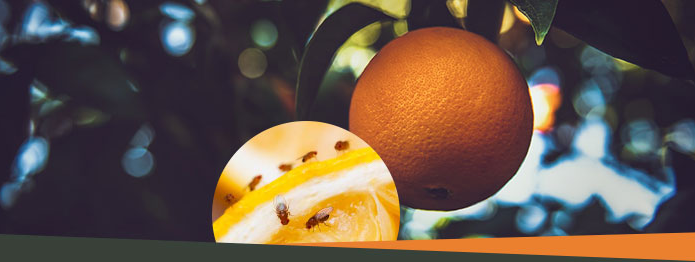Professional Pest Control: 5 Fun Facts about Fruit Flies

Fruit flies are tiny oval flies that feed on the fungus and rot that grows on the surface of decaying fruit, vegetables, and other organic items. Fruit flies living outdoors are highly active in the summer, with their number peaking during the harvest season. Indoors, with a consistent food source, they will thrive throughout the year. Fruit flies breed in damp, slimy places like sink drains, garbage cans, trash containers, wet mops, and empty bottles. One mating pair can produce hundreds of offspring within 10 to 12 days, and while they are generally seen as a nuisance pest, they can spread diseases and bacteria on their legs and bodies, so you need to keep them out of your home. Here are a few things you may not have known about fruit flies.
Catch Fruit Flies with Vinegar
Fruit flies may be attracted to your kitchen by the sweet temptation of rotting food, but they can’t resist the smell of fermentation. One of the easiest ways to make a fruit fly trap is to take a cup of apple cider vinegar, cover it with plastic wrap, make a few holes in the top and the fruit flies will be drawn to it like bees to honey. To make the trap work quickly, you can heat the vinegar to release more fragrance.
Fruit Flies are Ideal Lab Subjects
Fruit flies have a very rapid life cycle and this makes them ideal lab subjects. Because of their comparatively short life spans, researchers can easily study their genetic evolution over generations. What scientists have learned about fruit flies in 30 years of study would have taken 200 years to achieve using mice.
Studying Fruit Flies has led to Major Breakthroughs in Genetic and Medical Research
A pair of mating fruit flies produce hundreds of genetically identical offspring and this has given scientists a wealth of information about how genes work. Thomas Hunt Morgan was able to confirm the chromosomal theory of inheritance by studying fruit flies in the early 20th century. This won him the 1933 Nobel Prize in Physiology or Medicine. Fruit flies have 14,000 genes and in 2000 scientists successfully sequenced the entire fruit fly genome. 75% of the genes that cause diseases in humans are also present in fruit flies, enabling scientists to use them to simulate and study diseases like Parkinson’s, cancer and Alzheimer’s. They can also genetically modify fruit flies to study other conditions.
Fruit Flies were the First Animals in Space
Fruit flies were launched into space by American scientists in a captured Nazi V-2 rocket in 1947 and reached an altitude of 67 miles (109 km). On the rocket’s descent, a capsule containing the fruit flies broke away and parachuted safely back to earth. The fruit flies were recovered alive and unharmed. Since then fruit flies have regularly been used in space research.
Fruit flies Have Incredible Eyesight
The eyes of the fruit fly consist of 760 individual lenses and two-thirds of the fruit fly’s brain is responsible for visual processing.
How to Prevent a Fruit Fly Infestation in Your Home
There are several steps that you can take to reduce the chances of a fruit fly infestation on your property.
- Store food and drinks in closed containers
- Keep fruit and vegetables in the fridge
- Throw away overripe fruit and vegetables
- Inspect food for fruit flies before you buy it and bring it into your home
- Don’t leave dirty food containers and glasses standing around on countertops
- Regularly remove garbage from your property
- Make sure that garbage bins have tight-fitting lids and are kept closed at all times
You should always do your best to control fruit flies around your home but this can be difficult, and as soon as you see that you have an infestation, you need to call in a professional pest control service, like Truly Nolen. We will be able to help you with all your fruit fly problems and advise you on how to prevent an infestation in the future.